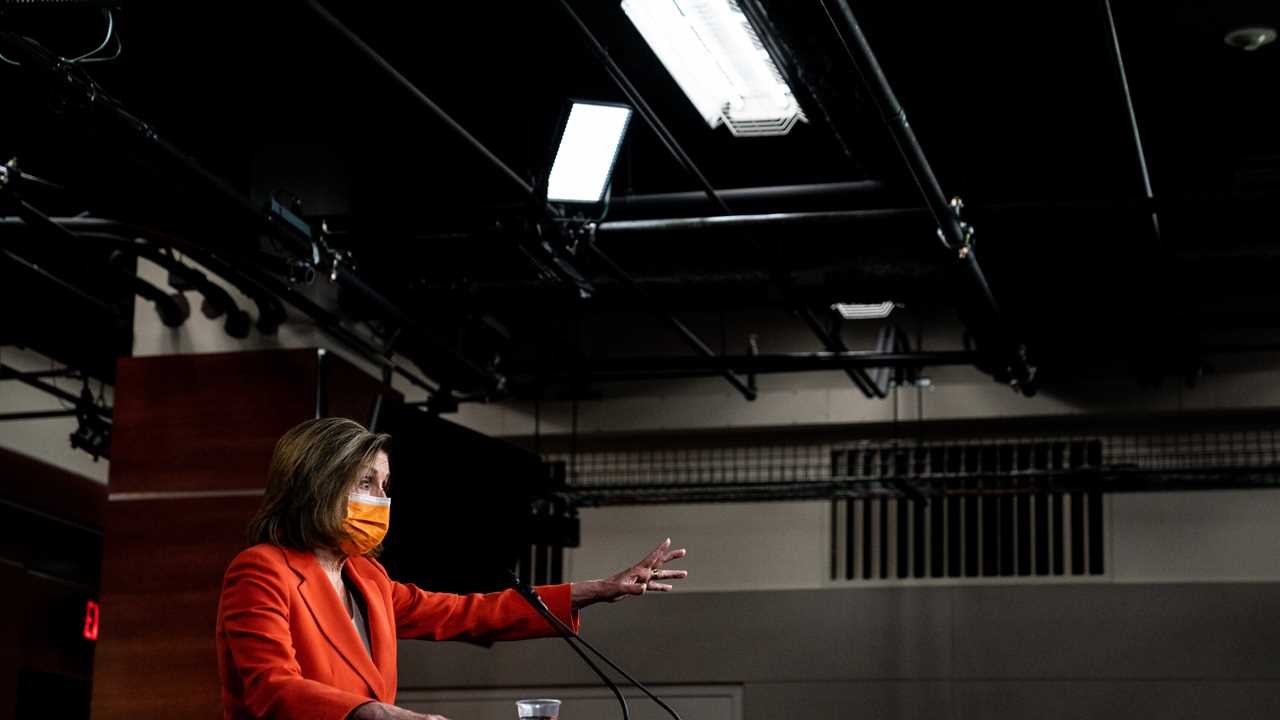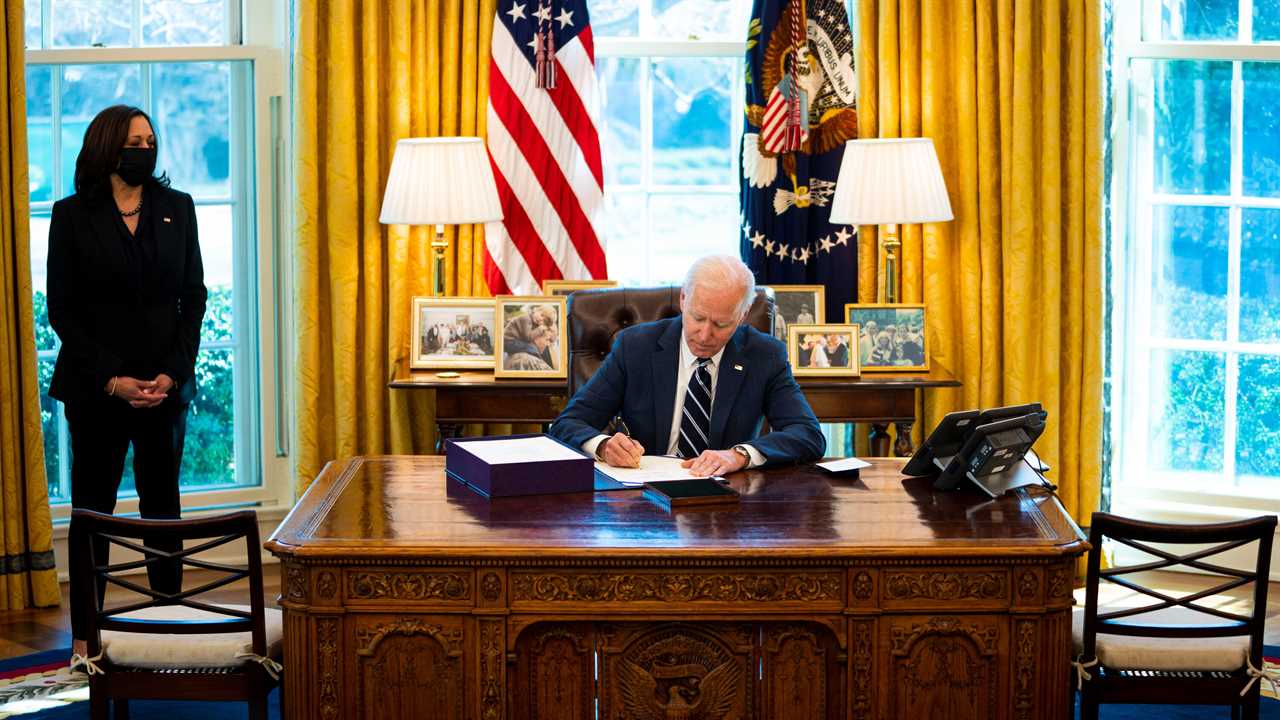
WASHINGTON — Congressional Republicans and Democrats finally agree on something: The pandemic rescue bill President Biden signed into law on Thursday is the largest expansion of government support programs in more than 50 years. Where they differ is on whether that is good or bad.
Trying to undermine the widely popular $1.9 trillion legislation, Republicans are denouncing the bill as “the most progressive domestic legislation in a generation.” They call it a spending spree that amounts to “a massive expansion of the entitlement system,” funds a longstanding “list of liberal priorities” and was muscled through on a party-line vote by Democrats unwilling to lower its price tag in drawn-out negotiations with Republicans. Democrats proudly own every word of that description.
“If you are a Democrat charged with that, you’d better prove yourself guilty,” said Senator Bob Casey, Democrat of Pennsylvania.
The question for Republicans is whether they can get away with excoriating a bill that will deliver tangible benefits in the form of cash, tax credits, help paying child care and health care expenses, and much more to millions of Americans who have struggled for a full year with financial devastation and uncertainty.
Biden Signs $1.9 Trillion Covid-19 Relief Bill
President Biden signed a historic $1.9 trillion economic relief package into law Thursday afternoon, a day earlier than the White House had planned, ushering in new federal aid across the country amidst the coronavirus pandemic.
It’s clear that an overwhelming percentage of the American people — Democrats, independents, our Republican friends — have made it clear, the people out there, made it clear they strongly support the American Rescue Plan. Yesterday, with the final passage of the plan in the House of Representatives, their voices were heard, and reflected in everything we have in this bill. And I believe this is, and most people, I think, do as well, this historic legislation is about rebuilding the backbone of this country and giving people in this nation, working people, middle-class folks, the people who built the country, a fighting chance. That’s what the essence of it is. What I’m going to do is sign this bill, and make a presentation tonight. And then there’s going to be plenty of opportunities. We’re going to be on the road, not only talking about — what I’m talking about tonight is the impact on the virus and how we’re going to end this pandemic. And we’re going to talk all the elements of the bill beginning Friday and Saturday, through the week. So, thank you for being here.

Democrats say that Republicans will have a very hard time doing so, if they even try. Democrats are unreservedly embracing the scope and cost of the plan they call transformative, bolstered by polls that show it is supported by a substantial majority of Americans, including Republican voters.
“I hope they all go home and tell those people they represent: ‘You really don’t need that $1,400. You haven’t suffered because of this pandemic. You haven’t had to care for a relative, a child who’s not been able to go to school,’” said Representative John Yarmuth, Democrat of Kentucky and the chairman of the Budget Committee. He predicted that Republicans would eventually “show up at every ribbon cutting, for every project that’s funded out of this bill, and they’re going to pump up their chest and take credit for all of these great benefits that are coming to their citizens.”
“Vote no and take the dough,” Speaker Nancy Pelosi cracked.
Republicans said that was not their plan, particularly after Senator Roger Wicker, Republican of Mississippi, was ridiculed this week for denouncing and voting against the bill, only to take to Twitter once it passed and applaud the inclusion of $28 billion for restaurateurs. That was just a few days after he had criticized the bill as packed with “unnecessary spending that will overheat the economy at a time when infections are dropping nationwide.”
Republicans are aware their comments on the measure will be watched carefully for evidence of hypocrisy. Party officials said they doubted others would follow Mr. Wicker’s lead — though it is a time-honored congressional tradition to try to win accolades for federal spending the public likes while complaining about the overall cost.
Privately, some top Republicans said they believed their pushback against the bill had been weak and too heavily focused on process, allowing Democrats to gain the upper hand with their celebration of the extensive help they are providing.
With the congressional debate done, the rush is now on by both parties to define the bill that is likely to be a main point of contention in next year’s midterm elections, as Democrats seek to retain their thin majorities in the House and the Senate against a Republican onslaught.
Hours after Mr. Biden signed the bill on Thursday, Ms. Pelosi issued a news release titled “Republican Lawmakers May Not Want to Check Their Local News,” packed with headlines from Republican congressional districts around the country hailing the measure’s passage and its benefits for each community.
The Republicans’ approach is to label the measure wasteful, unnecessary and packed with goodies for political allies of the Democrats. They argue that it is aimed at providing bailouts for fiscally strapped states and cities run by Democrats, paid for with taxes from their own red-state constituents, although the measure makes funding available to all states.
“My hardworking Iowans shouldn’t be paying to balance the budgets of states that have not been able to manage theirs, when Iowa does a tremendous job of taking care of our finances,” said Senator Joni Ernst, Republican of Iowa.
Republicans are also trying to grab credit of their own for any economic rebound that may materialize, arguing that it was their party’s earlier efforts when they controlled the Senate and the White House that have delivered vaccines, brought the economy to the brink of a comeback and gotten the pandemic under control.
“We’re on our way out of this,” Senator Mitch McConnell, Republican of Kentucky and the minority leader, declared on Wednesday. “We are about to have a boom. And if we do have a boom, it will have absolutely nothing to do with this $1.9 trillion.”
Other Republicans say they are convinced that once they finish airing out elements of the bill they intend to paint in the worst possible light — prepare to hear plenty about benefits for those in prison and undocumented immigrants — the public will turn against both the package and the party that delivered it.
“There is a race for branding,” said Senator Lindsey Graham of South Carolina, the top Republican on the Budget Committee. “There are some policy choices in that bill unrelated to Covid that I think are going to be problematic for our Democratic colleagues in the states that matter.”
He and other Republicans freely concede that certain parts of the measure, including the $1,400 in payments to millions of Americans to help with their costs from the pandemic, will be warmly received, providing a kind of “sugar high,” in the colorful words of Mr. Graham.
“I mean it’s certainly good politics to say, ‘Hey, we are going to hand you a check for $1,400,’” said Representative Tom Rice, Republican of South Carolina, who led the floor debate for his party as the House gave the measure final approval on Wednesday and offered the sweeping description of the bill that Democrats happily embrace. “What they don’t talk about is what this bill costs.”
With Donald J. Trump gone from the White House and Democrats now in charge of the House and the Senate, Republicans have resurrected their warnings about soaring federal deficits and the debt being piled on future generations while also sounding the alarm about inflation.
“You are going to see gas prices going up, interest rates going up, mortgage rates going up, car loans going up, prices at the grocery store going up,” said Senator John Barrasso of Wyoming, the chamber’s No. 3 Republican. “People are going to be bothered.”
Democrats argue that Republicans sound a little desperate in their efforts to stoke public opinion against the measure. Republicans succeeded in the 2010 midterm elections by accusing Democrats of wasteful spending through a stimulus and Wall Street bailout after an economic crisis. But Democrats believe those complaints have less salience today, particularly since the pandemic is more on the order of a natural disaster, not a crisis created by profit-seeking bankers.
They contend that the public appreciates and supports what they are doing, and is willing to spend what it takes to put down the pandemic and return life to the normal that Americans crave. Republicans will regret their stance, they say.
“This bill is historic in magnitude, and so is the disconnect between Republicans and reality — both the political reality and the economic background,” said Senator Richard Blumenthal, Democrat of Connecticut. “‘It is too big; it is too much.’ That’s their story and they are sticking to it. But people know that it is better to overshoot when you are in this kind of thing.”
“The more people learn,” he added, “the more they like.”






